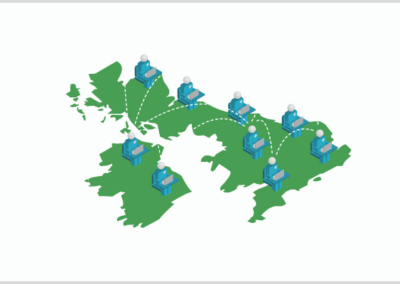‘It’s an absolutely brilliant service that didn’t exist before Consultant Connect, and there’s no way I could’ve received that level of service without it.’
Following the launch of the transformative same-day emergency care (SDEC) provision at the University Hospital of Wales in Cardiff and Vale University Health Board, we spoke with Dr Jonathon Campbell, GP Partner at North Cardiff Medical Centre. He regularly uses Consultant Connect to rapidly communicate with specialist clinicians, including medical SDEC, to support him in providing the best patient care.
Why is accessing pre-programmed numbers for specialties via Consultant Connect so valuable?
‘The number one benefit is the immediate advice from a higher-qualified practitioner. This enables us to brainstorm together, which is so important. That back-and-forth discussion with a specialist either confirms you’re on the right track or identifies alternatives for better patient care. General practice can be quite isolating; it’s not team-based like hospital set-ups, so being able to bounce ideas off with a specialist holds the most value.
‘A close second to that is access to hospital-level diagnostics, such as CTs and Echocardiograms. It’s the ability to get tests conducted within 24 hours and bring patients back to a clinic for the results, much quicker than what we have access to in Primary Care.
‘My role as a GP partner is part-time, which means that if I have a patient on a Wednesday who I think really needs to be admitted, I must consider whether they can wait until the following Monday for diagnostic results. Suppose a patient is really ill, and the other option is an admission. In that case, the ability to get them booked into an outpatient clinic on a Friday is a brilliant alternative to being admitted if I don’t feel confident waiting for five days.’
How would you have requested hospital diagnostics before Consultant Connect?
‘Previously, a request for enhanced diagnostics would be made digitally. The request would be sent off for processing and either approved or rejected, which can take days and is not rapid. The alternative would be to ring the hospital switchboard and try to get through to the department, which can take hours, time which is better spent seeing patients. Realistically, if I wanted my patient to have a scan rapidly, in that case, my options are to admit them to A&E, or if I request it urgently, depending on the priority, I can receive a response within a few days to a week. The appointment would then come through in a week or two. If I use Consultant Connect to request diagnostics, the appointment can be made in a few days.’
Patient Example
‘I had a gentleman who had been back and forth to see me with very vague symptoms: a fever, rash, pain and feeling generally unwell. His bloods weren’t matching a pattern that was consistent with his presentation. I treated him on a few occasions, and he would improve slightly and then decline. It was very strange and had continued for weeks. I called the medical SDEC line via Consultant Connect and discussed the patient with a consultant. I explained that the patient’s ferritin level was raised, and his hands were swollen; it looked rheumatological, but I didn’t have an answer. The consultant suggested I take some swabs, repeat the patient’s bloods, prescribe another course of antibiotics, and, in the meantime, send an urgent referral to infectious diseases. Within 20 minutes of that call, the consultant had phoned back to say he had spoken with a colleague, and they thought it could be stills disease. This is a rare condition, similar to adult-onset juvenile arthritis, and this diagnosis fit with the patient’s previous blood tests. The consultant advised that he had booked the patient for an urgent appointment with a practitioner specialising in diagnostic uncertainty the following day. The patient had an Echocardiogram, CT, blood cultures and an appointment, all within 48 hours of the phone call.
‘At the patient’s outpatient appointment, they ruled out a lot of very serious disorders, such as sepsis, endocarditis, and other autoimmune conditions, and he was then referred to rheumatology. The patient wrote to me within a week to give me a complete update and to advise that he was exceptionally happy with his level of care.
‘Had the consultant not discussed this case with a colleague, the patient’s problems could have persisted for at least six months, waiting for an urgent infectious diseases appointment. It’s an absolutely brilliant service that didn’t exist before Consultant Connect, and there’s no way I could’ve accessed that route and received that level of service without it.
‘As a GP, you usually ring an advice line because you’re in a 50/50 mindset: “Do I admit this patient, or is there something I’m missing?” In this case, if I hadn’t had access to medical SDEC, it would either have been an admission, or I would’ve discussed it with a primary care colleague, resulting in another treatment trial and bloods, or an urgent referral. But it still would have been many months before he was seen, and arguably seen by the wrong specialist, and all that time, he would have been suffering.
‘Using Consultant Connect for direct conversations eliminates that mixed messages element of relaying information to a triage nurse or junior doctor, who then conveys it to a consultant. It allows you to communicate your concerns directly, including any slightly odd direction you want the specialist to consider, and I find it so much easier. It gives a better quality of care, ensures patients get the care they need fast, and avoids potentially missed communication that can happen with typed letters due to time constraints.’
View and download a PDF version of this case study.
If you have any questions or would like to find out more, email hello@consultantconnect.org.uk or call us on 01865 261 467.



